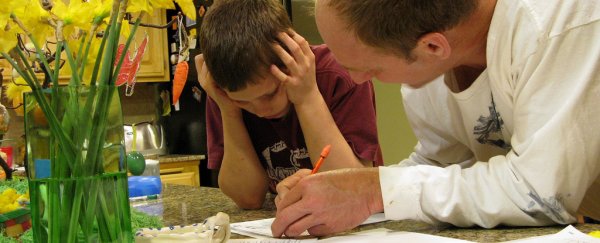Being highly involved with your child's education is a good strategy to help them excel, but there's a parenting line you don't want to cross, according to a new study.
Researchers in Australia say so-called helicopter parents who take an extreme approach to helping their kids complete their homework could be undermining their children's ability to learn on their own and find the motivation to get school work done without assistance.
"There is concern this greater parental involvement in ensuring homework is completed, particularly in high school, may be impacting the child's ability to take responsibility for their homework or understand the consequences of their actions," said clinical psychologist Judith Locke from the Queensland University of Technology (QUT). "The irony is a helicopter parenting style with the goal of fostering academic achievement could be undermining the development of independent and resilient performance in their children."
The researchers enrolled 866 parents of children from three separate inner-city schools in an online questionnaire that asked them about their parenting beliefs and intentions, and measured their attitudes with regard to their child's homework.
Scoring their responses on an overparenting measure called the Locke Parenting Scale (LPS), the researchers found that helicopter parents – those who achieved a higher LPS score – tended to take more personal responsibility for seeing that their child's homework was completed.
In addition to feeling greater responsibility and perhaps assisting their kids a little too much as a result, the parents with higher LPS scores also ascribed greater responsibility for homework completion to their child's teacher.
"These parents appear to not only help their child more, they also expect their child's teachers to help them more, particularly in the middle school and senior school years," said Locke. "Parental assistance with homework should slowly reduce as a child gets older and daily parental involvement in an adolescent's homework would be developmentally inappropriate."
The QUT study, published in the Journal of Psychologists and Counsellors in Schools, follows research in the US that suggests overparenting students at university level can be extremely detrimental to older offspring.
"Some parents choose their adult child's subjects, edit or complete their assignments and badger lecturers to improve their child's grades," said Locke. "When parents are making these decisions or providing academic pressure it has been found the adult student disengages from their education and often has increased depression and decreased satisfaction with life."
The researchers concede that further research needs to be done to demonstrate whether overparenting children at school level can cause equally destabilising effects, but even this early research suggests that overly helpful parents – who of course only wish the best for their child – might want to think about stepping back a little.
"Parental help can be constructive by showing interest and coaching them to complete their work," said Locke, "but unconstructive assistance includes telling a child the right answer or taking over from them when they are completing school tasks."
QUT are sponsors of ScienceAlert. Find out more about their research.
